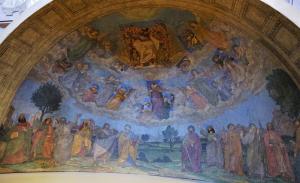
“It shall come to pass in the latter days that the mountain of the house of the LORD shall be established as the highest of the mountains, and shall be raised above the hills; and all the nations shall flow to it” (Isa. 2:2 RSV). Whatever is on earth shall be raised on high and glorified as it finds its place in heaven. Even what happens in the tragedy of history will not be lost but will be collected by the Lord and find its proper place in eternity.
Insofar as grace sanctifies something and makes it holy, it participates in heavenly glory, and because it participates in heavenly glory, it becomes a vessel for the sanctification of others. This is made possible because the Lord, Jesus, has taken the things of the earth with him into heaven and has granted them all a place in the eternal kingdom of God. The one who descended from on high to dwell among us has made room for us in heaven. Jesus emptied himself of his heavenly glory in order to become man; that glory was given unto the rest of creation, so that they have now received a share of his glory.
The ascension of Jesus, the ascension of the Son of Man, is the assumption of earth into heaven. Jesus, in his descent, made his way to us and through all creation; all things can and will experience the personal presence of the Logos. All things have been touched by grace, and because they have been touched by grace, there is room for them in the mystical body of Christ, the glorified body which made its way to heaven. All things have a place, not only in the drama of history, but in the kingdom of God.
Jesus, in his body, is the house of the Lord; his glorified body, the mystical temple, has been elevated and placed above all the hills, all the spiritual high places, so that all nations, all of creation, can be directed to him and flow into him. In and through him, in and through his mystical body, the tragedy of time is overcome and transcended. But we must be careful and realize this transcendence does not diminish or undermine time and what happens in it, but rather fulfills it, rendering it its proper due.
All that was written in the Law and the prophets, all the true religious aspirations found throughout the nations of the world, inspired in part by the Spirit, had to be fulfilled, so that Jesus could and would be revealed as the expectation of the nations. History, with all its tragedy, but also with all its joys, pointed to Christ and so found itself included in and taken up by Christ. Thus all that happens in time is reconfigured as it is given a new meaning in light of the resurrection and ascension of Christ. Tragedy does not have the final say. The kingdom of God with its sanctifying and deifying grace does. Sin has been overcome, and death itself has been used to undermine the sting of death. But to make sure that we would not just be stuck in history with all its difficulties and sorrows, the ascension was necessary, for through it the resurrection could lead to eternal glory and not just temporal immortality:
Then he said to them, “These are my words which I spoke to you, while I was still with you, that everything written about me in the law of Moses and the prophets and the psalms must be fulfilled.” Then he opened their minds to understand the scriptures, and said to them, “Thus it is written, that the Christ should suffer and on the third day rise from the dead, and that repentance and forgiveness of sins should be preached in his name to all nations, beginning from Jerusalem. You are witnesses of these things. And behold, I send the promise of my Father upon you; but stay in the city, until you are clothed with power from on high.”
Then he led them out as far as Bethany, and lifting up his hands he blessed them. While he blessed them, he parted from them, and was carried up into heaven. And they returned to Jerusalem with great joy, worshipped him, and were continually in the temple blessing God (Lk. 24:44-53 RSV).
Jesus overcame the tragedy of history from within history itself. Once that was accomplished, he ascended, preparing, as it were, heaven, the eternal kingdom of God, so that it could and would include all that he would take with him from temporal existence. His glorification was not for himself alone; it was for all, and so his ascension into heaven was the means by which he shared that glory to all. Now, people from all nations, indeed, whatever exists in creation, can join itself with the mystical house of the Lord, and be glorified in and through him.
The ascension is not the reversal of the incarnation, but its completion; in the ascension, Jesus did not cast aside his assumed nature, but rather he took it up with him. The house of the Lord, the body of Christ, truly had to rise up above all others, not in the sense of a physical locality, but in the sense of a metaphysical ascent, so that all creation could then follow him and be glorified in heaven. The incarnation took place through kenosis, but its completion lay in the glorification, and that glorification was not for himself alone. It was for all creation. Jesus shares the glory which he received in the resurrection with the whole of creation, and insofar as anything experiences its existence in and through union with him, they partake of that glory.
Jesus is in heaven, and all of creation will find its rightful place there by his side, making him truly Lord over all. The kingdom is not of the world, but includes the world; the kingdom of God is beyond the tragedy of the world but it does not undermine it. What we do matters, and Jesus, in the ascension, makes sure it matters. We might not yet understand how this could be, how we can find meaning and value in all the injustices of temporal history, but Jesus shows us it is so, even as he showed the apostles the wounds of the cross on his glorified body. All the sorrows of life will be transformed into something new, allowing them to somehow be made things of glory. This is what we are promised, this is our hope, and this is how and why the ascension itself is not a secondary part of the incarnation but one of its major components. For through it, we realize the value of history and all that happens in it shall not be cast aside.
Stay in touch! Like A Little Bit of Nothing on Facebook.
If you liked what you read, please consider sharing it with your friends and family!













